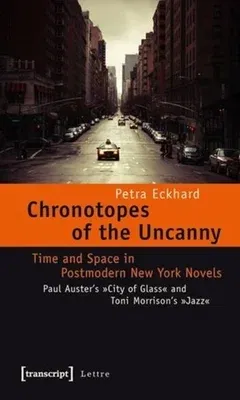Petra Eckhard
(Author)Chronotopes of the Uncanny: Time and Space in Postmodern New York Novels. Paul Auster's City of Glass and Toni Morrison's JazzPaperback, 27 July 2011

Qty
1
Turbo
Ships in 2 - 3 days
In Stock
Free Delivery
Cash on Delivery
15 Days
Free Returns
Secure Checkout

Part of Series
Lettre
Print Length
206 pages
Language
English
Publisher
Transcript Publishing
Date Published
27 Jul 2011
ISBN-10
3837618412
ISBN-13
9783837618419
Description
Product Details
Author:
Book Format:
Paperback
Country of Origin:
DE
Date Published:
27 July 2011
Dimensions:
22.35 x
13.46 x
1.52 cm
ISBN-10:
3837618412
ISBN-13:
9783837618419
Language:
English
Location:
New York
Pages:
206
Publisher:
Series:
Weight:
249.48 gm